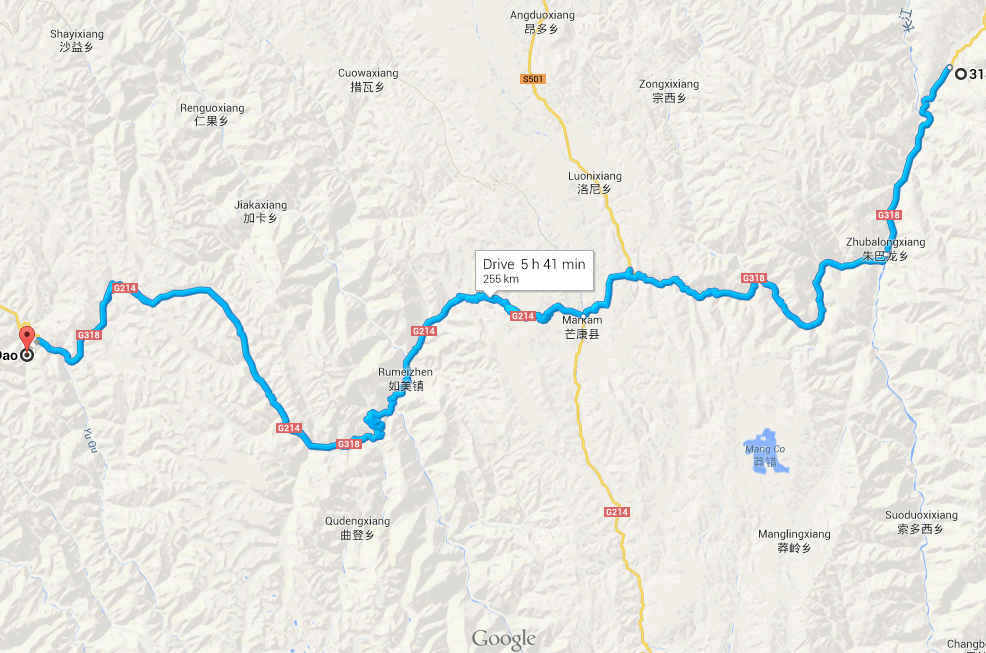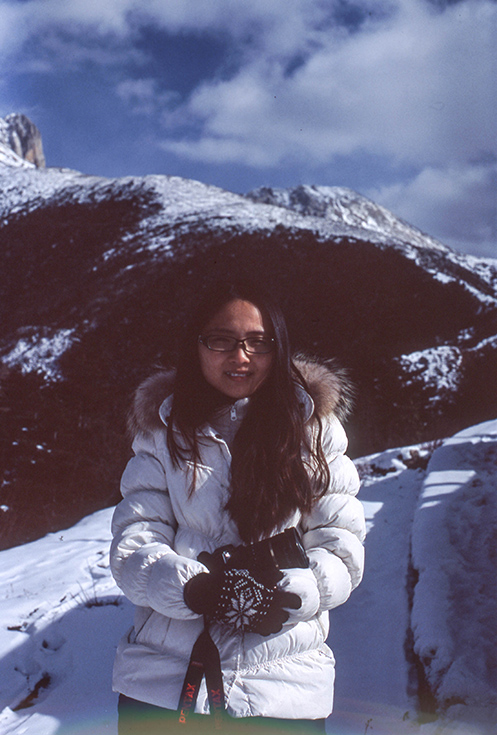Ba'thang to Zuo Gong
December 2013
"Nobody attempts Tibet in Winter"

I do not want to be too specific about how I made it past the first check point. 30 minutes down from Ba'thang you would reach a river. The bridge across
leads to a high security custom check point manned 24/7 by a couple of policemen. All visitors, including PRCs, Hongkongers, Tibetans and
surely foreigners have to register in the office. The registration consists of a simple visual checking of your permits and identity cards. They will
document your name down and inquire where you are heading. I suppose all these information would be transmitted downwards to the other check
points.
After I passed the first check point, I had the wrong impression that life would certaintly get much better. No, the next check point would happen
about 2 hours away, so on and so forth. The journey to Zo Gong was punctured by many check points. Everytime a check point comes, our vehicle
would slow down and I would have to crawl into a narrow tight space at the car boot to avoid detection. The risks were high. I had not signed up for this.
By evening time, my enthusiasm quickly gave way to a gripping horror. I saw for myself the huge police presence in all the small towns I passed.
Zo Gong was the worst. The town was literally swarming with Police officers. It was dark and we were hungry. I was afraid to leave my vehicle.
Eventually we decided to stay at a really run down hostel at the outskirts of town. Zo Gong was totally frozen that time. All electricity and water
were down. The power plant was shut down and pipes have all exploded due to frozen water. All toilets no longer have flushing and there was
no water to wash your hands after defecation. People literally went to the side of the river to do their solid business.

The pilgrim. He comes from a village in Ganzi and would spend the next 18 months of his life prostrating all the way to Lhasa.
Such is the intense devotion to religion for many Tibetans.





After parking our vehicle at the garage of a hostel. We went over to a local Tibetan restaurant for food. Our Tibetan driver himself does not
know how or what to order. He was too used to eating Chinese food back in Shangri-La. There was a coal incinerator in the room and many
people were gathering around the stove. Suddenly, we saw a Police officer peering through the glass doors and he came into the
room. We quickly took off our spectacles (I figured we could be the only two in town with glasses) and sat by the stove. I thought that would be
the moment of my arrest. Thankfully, he walked away and did not suspect we were foreigners.


The hostel we lodged in cost us less than $15 a night for a room of two. We spent the rest of the night chatting with him. He did not realize
I was a foreigner. "Traveling to Tibet is even harder than going overseas" he said, even as a Han Chinese. "Everywhere you go, you
will meet a bloody Police check point and be required to register at the office". I broached the topic of foreign tourism in this part of Tibet.
"Non-existent", he said. The few times he saw foreigners was when the police caught a few who sneaked in and would lodge them cheap at his place before
deportation". He told me to register myself with my ID in the hotel register. Why? I asked. Would they check in hostels like this?
Apparently the Police would check every hostel every night. I was petrified. "They would search the rooms for foreigners and drag them out" he
said while lighting a cigarette. I had told him I was a Hong Konger. "Don't worry, no issues for Hong Kongers", he smiled.
Zo Gong was freezing that night at -20 celsius. There was no heater in the room. Just a barel working heat pad below our blankets and a small
candle on the coffee table. The rooms are small, smelly and dirty. I think some people had wiped their snot all over the walls. I still have a video
of my room. If you want to watch it do send me an email. The doors have no lock. Despite the harsh conditions and constant watch over the doors,
we slept. It was Saturday night and the Police went out for a party. They never came.
I made a conscious decision to leave Tibet as soon as possible. We left the very next morning and turn back to Yunnan. This time round, for
conveniece, we would make a run through Yan Jing back to Shangri-La.

editor's note:
the photographs in this series are either digital (pentax k30, sigma 35/1.4, DFA 50/2.8, Tamron 10-24)
or analogue (Pentax ME Super, K50/1.4, assorted films including portras, provia, profotoxl)
home | travelogue | guestbook